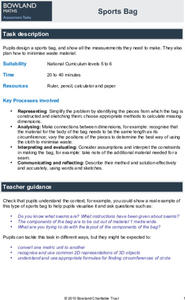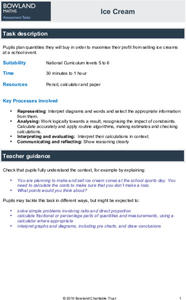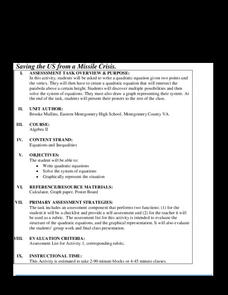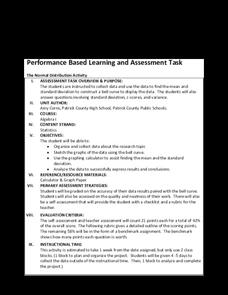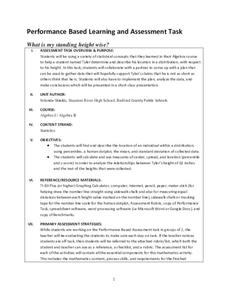Bowland
Tuck Shop
Correct a misleading conclusion. Individuals review a set of data and a conclusion to determine what is wrong with the conclusion. Pupils then represent the data with an appropriate display. Finally, learners develop a correct conclusion...
Bowland
Taxi Cabs
Determine the cheapest way to the airport. Pupils read a scenario about trying to get 75 people to the airport using two different sizes of taxis. Learners calculate the number of smaller taxis needed given a number of large taxis and...
Bowland
Sports Bag
Lay it out using the least amount of material. Learners use the dimensions of a cylindrical sports bag to find out the size of pieces of material needed to sew them. The pupils find the best placement of the pieces to use the least...
Bowland
Security Camera
Take an overall view of percentages. Pupils determine whether a shop owner's claim is correct about what percent of his shop is viewable from the installed security camera. Learners try to find whether there is a better location for the...
Bowland
Patchwork Cushions
Find out if there are enough squares. Given diagrams for the first four figures in a sequence, pupils try to determine the next figure. Individuals find the number of square and triangle pieces of fabric that are required to make...
Bowland
Ice Cream
Make sure there is enough ice cream on hand. Learners try to find out how much ice cream to buy for a sports event. Scholars use a pie chart showing the percent of a sample of people who like different flavors of ice cream. Using the...
Bowland
Counting Trees
Let's find a way to determine how many there are. Given a diagram of trees on a plantation, pupils devise a way to estimate the number of old and new trees. Using their methods, learners create estimates for the number of the two types...
Bowland
Lottery
Take a chance on raising money. Learners calculate probabilities to determine whether a lottery is a good way to raise money. Pupils determine the number of combinations of choosing two numbers between one and six. Using the sample...
US Department of Commerce
Learning About College Degrees and Lifetime Earnings
It's never too early to start thinking about college majors. Using census data, scholars research the lifetime earnings for two selected careers. They then write and solve word problems to compare the amounts. To add a visual component,...
New Mexico State University
Creature Caverns
Plot the relationship of characteristics of creepy creatures. Learners plot the coordinates to describe the number of eyes, horns, and/or brains different creatures have. Pupils fill out a table to plot the points and complete the pattern.
New Mexico State University
Curse Reverse
Build towers with algebraic expressions. Pupils use algebraic expressions to build towers that allow their players to navigate a series of rooms. Learners evaluate expressions using different values for the variables to create a pathway...
Radford University
Skate Ramp
Going up and down makes a more exciting ride. Pupils recall what they know about continuity and limits of functions. Working in groups, classmates design a skateboard ramp that meets a given set of criteria, using at least three...
Radford University
Animal Decline
Where did they all go? Small groups collect data on different animal species that are on a decline. Teams develop equations to model the populations over time and then create presentations about the decline of their animals. Classmates...
Radford University
Saving the US from a Missile Crisis
Mathematically shoot down an incoming missile. Given information about the Cuban Missile Crises, learners calculate the equation of the trajectory of an imaginary missile launched from Cuba toward Washington, D.C. Scholars determine the...
Radford University
Box-and-Whisker Activity
Think inside the box. Working in small groups, pupils design a study to answer comparing two data sets. Team members collect data and construct box-and-whisker plots and analyze them to prove or disprove their hypothesis. They develop...
Radford University
The Normal Distribution Activity
For whom does the bell fit? Pupils begin by working in groups gather data on three different variables. They then determine the mean and standard deviation of each data set and create bell curves. To finish, they answer guiding questions...
Radford University
Are We Normal?
Develop a sense of normal. Learners develop two questions to ask classmates to gather numerical data before creating a box and whisker plot and a histogram to display their data. Class members make inferences and investigate the data...
Radford University
Can I Create a Line/Curve of Best Fit to Model Water Drainage?
Learners collect data on the amount of water left in a bottle over time. They graph the data to determine whether the scatter plot shows a curved or straight relationship. Group members then determine an equation for the curve of best...
Radford University
What is My Standing Height Wise?
Given a scenario in which a class member wants to prove his height is not an outlier, pairs devise a plan and gather evidence to help support his claim. The small groups implement their plans and create graphical displays of their data...
Radford University
Green Cravings
Build up a bag of green. Pupils determine the number of green Skittles in a snack bag and come up with a way to determine how many snack bags it would take to create one bag of only green Skittles. Classmates share their methods and...
Radford University
Surface Area of Boxes
Explore surface area out of the box. Pairs investigate surface area by measuring two boxes and calculating the area of each side. Classmates trace one of the boxes onto butcher paper and create a net with the same area. Groups then...
Radford University
Fuel Efficient Function Activity
Pupils research the five most fuel efficient vehicles of the same type and come up with a way to display the mile per gallon for each vehicle. After choosing a vehicle, scholars create graphs to display miles traveled given the amount of...
Radford University
Finding Slope
The class takes a trip about the school and find four places to measure the rise and run of objects that represent slope in the building. Pairs work together to calculate the slope of each object and determine whether any ramp they find...
Radford University
Action Bungee Jump
Drop scatter plots onto the class. Teams collect data to determine how far an action figure will fall suspended by rubber bands. Using the collected data, groups determine a line of best fit. Given a drop height, they also determine the...




